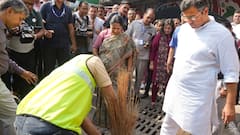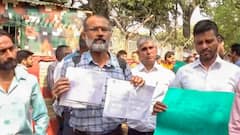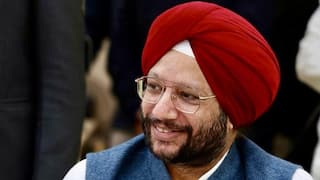SC Says Giving Power To LG To Nominate Aldermen Can Destabilise Elected Municipal Corporation
The SC bench raised concerns regarding the level of importance attached to the nomination of specialised individuals to the MCD by the central government.

The Supreme Court of India expressed concern on Wednesday over the potential destabilisation of an elected civic body if the Lieutenant Governor is granted the power to nominate aldermen to the Municipal Corporation of Delhi (MCD). The court, led by Chief Justice DY Chandrachud, along with Justices PS Narasimha and JB Pardiwala, made this observation while reserving its verdict on the plea of the Delhi government challenging the lieutenant governor's authority to nominate aldermen.
MCD currently comprises 250 elected members and 10 nominated members. In December of last year, the Aam Aadmi Party (AAP) defeated the Bharatiya Janata Party (BJP) in the civic elections, marking the end of the BJP's 15-year tenure at the helm of the MCD. The AAP secured victory in 134 wards, while the BJP won 104 seats, with the Congress finishing a distant third with nine seats.
The bench raised concerns regarding the level of importance attached to the nomination of 12 specialised individuals to the MCD by the central government.
"Is the nomination of 12 specialised people in MCD of that much concern to the Centre? Actually, giving this power to the LG would effectively mean that he can destabilise the democratically elected Municipal Committees because they (aldermen) will have voting powers also," the bench said.
The Chief Justice in his observation said: "Because these people will sit in standing committees...by taking 10 people of his choice he can effectively... they have the voting power then..."
Additional Solicitor General Sanjay Jain, representing the Lieutenant Governor's office, highlighted the 69th amendment and the GNCTD Act, which collectively establish the governance mechanism for Delhi. Jain emphasized that the LG's role in the MCD is distinct from that of an administrator when acting on the "aid and advice" of the Council of Ministers under Article 239AA.
Referring to the Act, Jain said there are some powers which are entrusted to administrators and some others are given to the government.
Justice Narasimha questioned Jain about the autonomy of the power conferred upon the administrator and whether it can be withheld from the state government.
Senior advocate Abhishek Singhvi, representing the Delhi government, argued that no separate powers have been granted to the state government for nominating individuals to the MCD. Singhvi further stated that the practice of the lieutenant governor nominating aldermen based on the advice of the city government has been followed for the past 30 years.
Singhvi clarified that the Lieutenant Governor never appoints aldermen independently, instead, the nominations are made by the President upon the advice of the Union government.
Singhvi pointed out that files marked to the state government halt at its doorstep, while files marked to the lieutenant governor require him to act based on the advice of the state government.
Jain argued that the following practice for 30 years does not necessarily validate its correctness.
The bench cautioned against granting the Lieutenant Governor the power to nominate aldermen, as it could potentially destabilize the democratically elected MCD, given the influence these aldermen hold in standing committees and their voting power.
Jain, however, contended that these nominated aldermen do not possess significant power. Singhvi refuted Jain's claim, asserting that aldermen are appointed to ward committees and have voting power within them.
The bench requested both Singhvi and Jain to submit their written submissions within two days and stated that a verdict would be issued on the plea.
Related Video
Delhi News: Toxic Air Engulfs Capital as CM Rekha Gupta Alters Office Timings Amid Pollution
Top Headlines





































